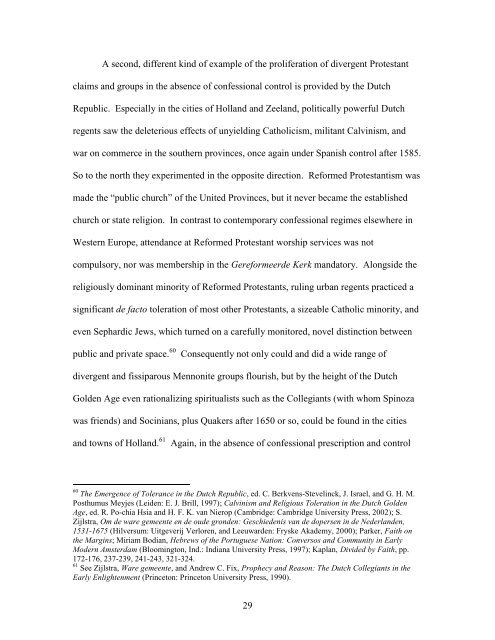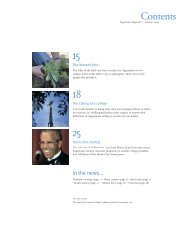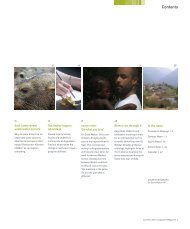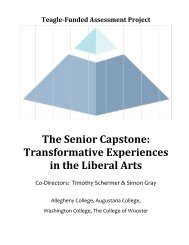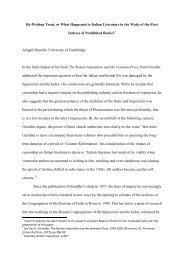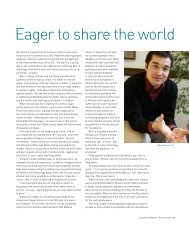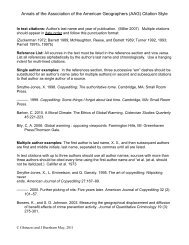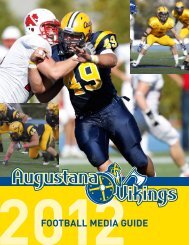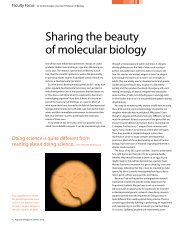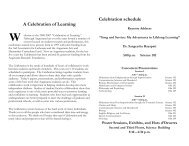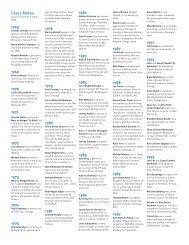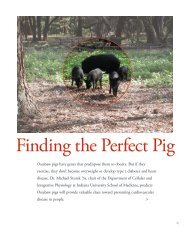Brad S. Gregory - Augustana College
Brad S. Gregory - Augustana College
Brad S. Gregory - Augustana College
You also want an ePaper? Increase the reach of your titles
YUMPU automatically turns print PDFs into web optimized ePapers that Google loves.
A second, different kind of example of the proliferation of divergent Protestant<br />
claims and groups in the absence of confessional control is provided by the Dutch<br />
Republic. Especially in the cities of Holland and Zeeland, politically powerful Dutch<br />
regents saw the deleterious effects of unyielding Catholicism, militant Calvinism, and<br />
war on commerce in the southern provinces, once again under Spanish control after 1585.<br />
So to the north they experimented in the opposite direction. Reformed Protestantism was<br />
made the “public church” of the United Provinces, but it never became the established<br />
church or state religion. In contrast to contemporary confessional regimes elsewhere in<br />
Western Europe, attendance at Reformed Protestant worship services was not<br />
compulsory, nor was membership in the Gereformeerde Kerk mandatory. Alongside the<br />
religiously dominant minority of Reformed Protestants, ruling urban regents practiced a<br />
significant de facto toleration of most other Protestants, a sizeable Catholic minority, and<br />
even Sephardic Jews, which turned on a carefully monitored, novel distinction between<br />
public and private space. 60 Consequently not only could and did a wide range of<br />
divergent and fissiparous Mennonite groups flourish, but by the height of the Dutch<br />
Golden Age even rationalizing spiritualists such as the Collegiants (with whom Spinoza<br />
was friends) and Socinians, plus Quakers after 1650 or so, could be found in the cities<br />
and towns of Holland. 61 Again, in the absence of confessional prescription and control<br />
60 The Emergence of Tolerance in the Dutch Republic, ed. C. Berkvens-Stevelinck, J. Israel, and G. H. M.<br />
Posthumus Meyjes (Leiden: E. J. Brill, 1997); Calvinism and Religious Toleration in the Dutch Golden<br />
Age, ed. R. Po-chia Hsia and H. F. K. van Nierop (Cambridge: Cambridge University Press, 2002); S.<br />
Zijlstra, Om de ware gemeente en de oude gronden: Geschiedenis van de dopersen in de Nederlanden,<br />
1531-1675 (Hilversum: Uitgeverij Verloren, and Leeuwarden: Fryske Akademy, 2000); Parker, Faith on<br />
the Margins; Miriam Bodian, Hebrews of the Portuguese Nation: Conversos and Community in Early<br />
Modern Amsterdam (Bloomington, Ind.: Indiana University Press, 1997); Kaplan, Divided by Faith, pp.<br />
172-176, 237-239, 241-243, 321-324.<br />
61 See Zijlstra, Ware gemeente, and Andrew C. Fix, Prophecy and Reason: The Dutch Collegiants in the<br />
Early Enlightenment (Princeton: Princeton University Press, 1990).<br />
29


